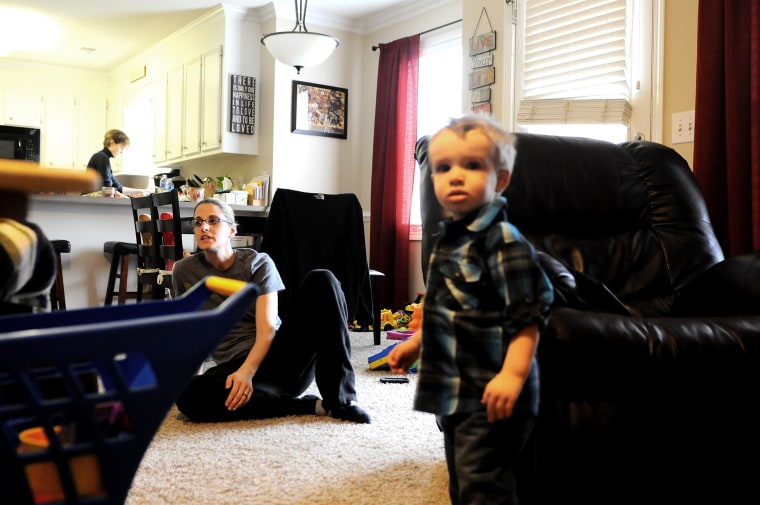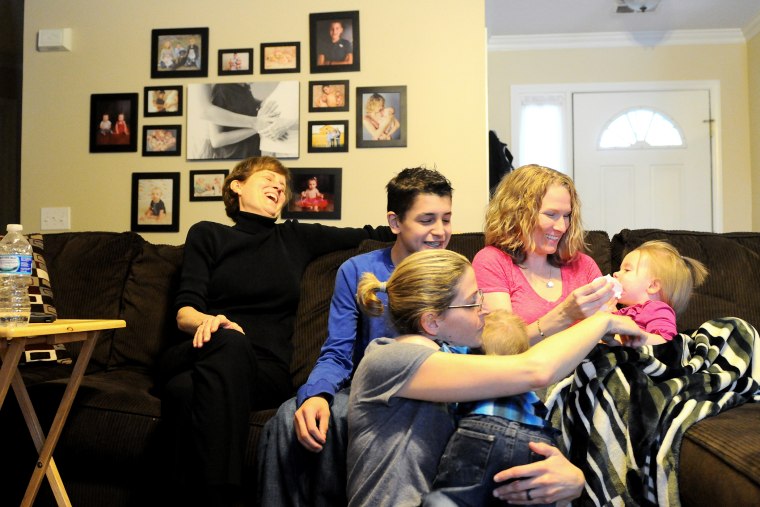LEXINGTON, S.C.-- The laws in their home state of South Carolina work against them, but Tracie Goodwin and Katie Bradacs have built a life and family together. They were married in Washington, D.C. in 2012, and their home and kids are their pride and joy.
And like many same-sex couples -- from Arizona to West Virginia -- Goodwin and Bradacs feel emboldened by the Supreme Court’s ruling that struck down the Defense of Marriage Act. The couple has filed suit against South Carolina’s ban on same-sex marriage, which the state passed into law in 1996 and voters reaffirmed through an amendment in 2006.
Goodwin and Bradacs are the first couple in the state to challenge the ban, and they expect resistance from the state’s Republican Gov. Nikki Haley, who is named as a defendant, along with South Carolina Attorney General Alan Wilson, in the suit filed in August. Haley is up for re-election this year, and she says the state’s residents have spoken and it’s her duty as governor to uphold the law.
“We expect to be denied here. We expect it to go up. We know that. They’re not going to give in,” Goodwin, 35, who works in IT for the state, explained while curled up on her couch one afternoon in late December. Bradacs, 31, a highway state trooper, is in the nearby kitchen preparing grilled cheese sandwiches.
Two other couples had planned to join them in a class-action suit against the state, but the fear of exposure and potential loss of employment led the others to stand down. Goodwin's and Bradacs' attorney, Carrie Warner, believes a hearing could in the case could come as soon as next month.
Ordinary life
As a couple, Bradacs and Goodwin embody middle-class stability: They live in a cozy, three-bedroom brick home in Lexington, a sleepy town just west of Columbia, the state’s capital. They have their hands full with son Baylie and daughter Colbie, one-and-a-half year old fraternal twins. Bradacs’ son from a previous marriage, Jordan, keeps his room above the garage spotless, and Bradacs’ parents, resettled from Michigan, live just down the road.

In September 2011, Bradacs and Goodwin were having dinner at their favorite Thai restaurant when Bradacs proposed. She had made plans: days earlier, Bradacs smuggled out a fortune cookie, meticulously opened the wrapper and pulled out the fortune with tweezers, inserted the proposal and re-sealed the wrapper.
“I was very impressed,” Goodwin laughs while showing pictures of the dinner on her iPad mini.
But the couple's path to stability was littered with hurdles. By early 2010, Bradacs and her son were staying regularly with Goodwin in her Lexington home. Goodwin, then a police officer for the Springdale Police Department and an Air Force veteran, says she was fired from her job after the department learned the couple enrolled Jordan in a school using Goodwin’s address. She changed career fields to IT.
“It didn’t make sense; I was such a community-oriented person … I received the Palmetto Patriot Award from the Lieutenant Governor [the highest honor a Lt. Gov. can award a citizen], which is not given out very often,” Goodwin says.
Bradacs found work as a police officer in a neighboring jurisdiction. Goodwin and the department settled in 2012 out of court.
When the couple chose to have children with Bradacs’ eggs and Goodwin as the birth mother, adoption wasn't easy -- even though they were legally married in D.C. and South Carolina has no laws against same-sex adoption.
“It was hard to find a judge in the state to sign off on same-sex adoption,” Bradacs says.
So when Warner, the couple’s attorney, began looking for a couple to challenge the state’s gay marriage ban, Bradacs and Goodwin were ready. They didn't want to move to a blue state; to them, the south is home. But they were no longer willing to accept the laws binding their family.
“We can’t just do what every other couple can do and it’s no thing. They don’t even think about it. You have a child; you put them on your insurance; you get married; you put your wife on your insurance,” Bradacs says.
In the 18-page suit, Bradacs and Goodwin argue the state’s ban on same-sex marriage and the prohibition against recognition of same-sex marriages from other states leave the couple and their children “stigmatized and relegated to a second class status.” Were Bradacs to be killed in the line of duty, Goodwin wouldn’t be entitled to financial assistance. And Goodwin wouldn’t receive Bradacs’ disabled service weapon as a memento, which is something the state currently grants to married heterosexual couples which include a police officer.
“I think we all need to do a lot more work in states like South Carolina to tell the stories of South Carolina couples and their kids and their loved ones,” says Evan Wolfson of the national Freedom to Marry organization. There are currently more than 30 cases in 20 states brought by couples challenging marriage bans, he says.
In something of an ironic twist, since both women work for the state of South Carolina, the couple is essentially suing their employer, a potentially risky move in a state that also has no workplace protection laws for LGBT residents. Yet neither woman seems particuarly fearful of losing her job this time. Both Bradacs’ boss and Goodwin’s boss are aware of the suit.
“I think we have a very fair shot at things going our way,” Warner told msnbc by phone. ”Neither side is going into this expecting this is going to be the final say. Whatever happens, either side is going to appeal it. We do have a very good shot at changing state policy just at this level.”
Judge Michelle Childs, who was nominated by President Obama in 2009 to serve on the U.S. District Court for South Carolina, is expected to hear the case.
Goodwin and Bradacs, who aren't overly political but identify as liberal, don’t see themselves as trailblazers, nor do they share their attorney’s belief that the suit will change South Carolina law. But they believe marriage equality is inevitable in the state. They foresee South Carolina recognizing same-sex marriages within five years, no matter the outcome of their lawsuit.
"Times are changing, things are changing," Bradacs said. "South Carolina is just slow."
